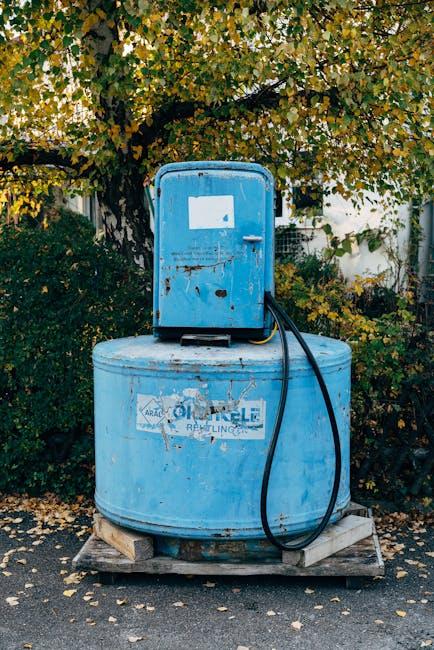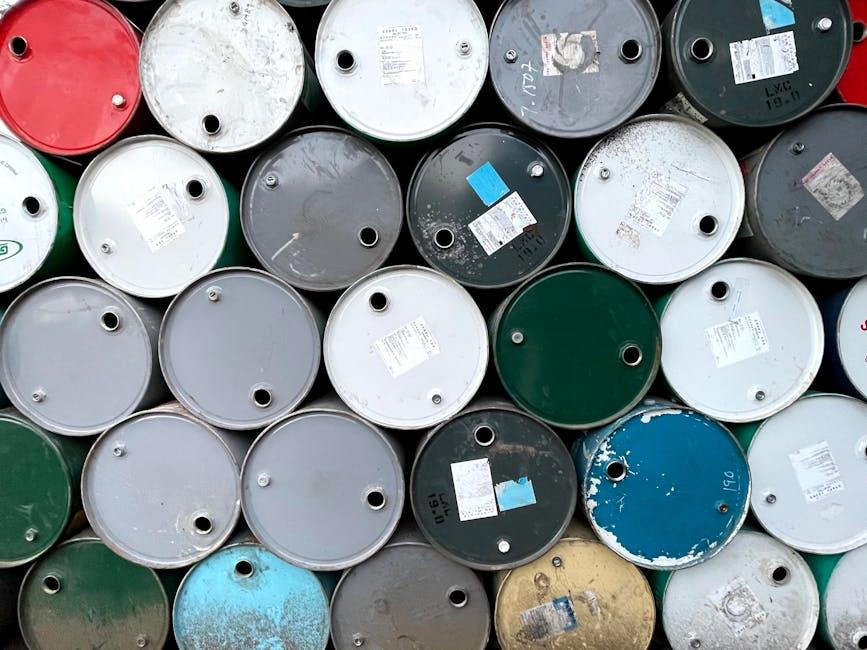Every drop of motor oil tells a story—one of power, protection, and performance under your vehicle’s hood. But once it’s done lubricating and cooling your engine, that same oil can become a hidden hazard if not disposed of correctly. Improperly discarded used motor oil can seep into the ground, poison waterways, and harm wildlife, turning something once vital into an environmental menace. Understanding the right way to dispose of this black gold is not just a matter of responsibility, but a simple act that contributes to a cleaner, safer planet. In this article, we’ll explore practical steps and tips on how to dispose of used motor oil properly, ensuring that your maintenance routine supports both your vehicle and the world around you.
Table of Contents
- Understanding the Environmental Impact of Improper Motor Oil Disposal
- Identifying Safe Collection and Storage Methods for Used Motor Oil
- Locating Certified Recycling Centers and Drop-off Facilities
- Step-by-Step Guide to Transporting Used Motor Oil Without Spills
- Exploring Alternative Uses and Reuse Options for Used Motor Oil
- Legal Regulations and Community Programs Supporting Oil Recycling
- Q&A
- The Way Forward

Understanding the Environmental Impact of Improper Motor Oil Disposal
Disposing of used motor oil carelessly can lead to severe environmental consequences. This substance contains toxic chemicals and heavy metals that, when released into the soil or waterways, contaminate drinking water sources and harm aquatic ecosystems. Even a small amount of improperly discarded oil can pollute thousands of gallons of water. Beyond the immediate threat to wildlife, these pollutants can accumulate in the food chain, affecting animals and humans alike. The persistence of motor oil contaminants means that recovery can take years, making prevention through proper disposal crucial.
The dangers extend beyond environmental pollution. Improper disposal can clog drainage systems and increase the risk of fires and hazardous spills in landfills. Communities can face costly cleanup efforts and public health issues from exposure to oil-contaminated environments. To minimize this impact, it is essential to follow responsible disposal methods. Consider the following key reasons why proper motor oil handling matters:
- Protects aquatic life by preventing toxic runoff.
- Preserves soil quality and reduces land degradation.
- Prevents groundwater contamination ensuring safe drinking water.
- Supports recycling efforts since used oil can be re-refined into new lubricants.
| Environmental Risk | Potential Impact | Duration of Harm |
|---|---|---|
| Water contamination | Affects fish and human health | Years to decades |
| Soil degradation | Reduces fertility and plant growth | Decades |
| Air pollution (from burning) | Releases toxic fumes | Immediate to short-term |

Identifying Safe Collection and Storage Methods for Used Motor Oil
When handling used motor oil, it’s crucial to utilize containers that are both secure and designed to prevent leaks. Preferably, choose containers made of durable plastic or metal with tight-fitting lids to eliminate any risk of spills or contamination. Avoid using containers that previously held chemicals or food products, as residues can react dangerously with the oil. Clearly label your container with the words “Used Motor Oil” to ensure proper identification and avoid accidental misuse. Storing your used oil in a cool, dry place away from direct sunlight and heat sources is vital to maintaining the integrity of the oil until it can be transported to a recycling center.
- Use leak-proof containers: Prefer containers with screw caps or secure seals.
- Label containers clearly: Prevent accidental mixing or disposal errors.
- Store in a well-ventilated area: Keep away from ignition sources and children.
- Keep containers upright: Avoid spills and ensure safe handling.
| Container Type | Recommended Use | Storage Tips |
|---|---|---|
| HDPE Plastic Jugs | Common for storage and transport | Keep away from direct sunlight |
| Metal Drums | Ideal for larger quantities | Store on level ground, secure lid tightly |
| Glass Containers | Not recommended: prone to breakage | Use only with secondary containment |

Locating Certified Recycling Centers and Drop-off Facilities
Finding the right place to dispose of your used motor oil is essential for protecting the environment and complying with local regulations. Start by checking with your city’s municipal waste management website, where certified recycling centers and authorized drop-off sites are often listed. Many automotive shops and service stations also provide safe recycling options—don’t hesitate to ask your trusted mechanic or dealer. Additionally, certain retail chains that sell motor oil offer convenient recycling programs, helping you turn in used oil without extra trips.
To make your search easier, here is a quick reference table outlining typical facilities that accept used motor oil, including common services they offer:
| Facility Type | Accepted Items | Services Provided |
|---|---|---|
| Certified Recycling Centers | Used Motor Oil, Oil Filters | Safe oil collection, free containers |
| Auto Repair Shops | Used Motor Oil | Drop-off during business hours |
| Retail Stores | Used Motor Oil, Oil Containers | Oil recycling programs, educational brochures |
| Municipal Collection Events | Used Motor Oil, Household Hazardous Waste | Temporary collection, community awareness |
- Verify hours and any fees before visiting a facility.
- Use proper containers to avoid spills during transport.
- Keep records if required by local regulations.

Step-by-Step Guide to Transporting Used Motor Oil Without Spills
Begin by choosing a clean, sealable container specifically designed for holding motor oil—never use containers meant for food or beverages. Before pouring, double-check the container for any cracks or defects that could lead to leaks. Carefully funnel the used oil into the container using a clean, wide-mouthed funnel to reduce spillage and splashing. Once filled, secure the lid tightly and wipe off any oil residue on the outside to prevent mess during transport.
When transporting, keep the container upright and place it in a stable position in your vehicle to avoid tipping over. Avoid placing it near direct heat sources or sharp objects that could damage the container. As a precaution, carry absorbent materials like old rags or kitty litter in case of accidental drips. Here are some quick tips to remember:
- Use sturdy plastic or metal containers.
- Label the container clearly as “Used Motor Oil”.
- Do not mix oil with other substances.
- Transport in a vehicle trunk or bed, secured against movement.
| Common Container | Pros | Cons |
|---|---|---|
| Plastic Motor Oil Bottles | Lightweight, easy to seal | Can crack if mishandled |
| Metal Cans | Durable, reusable | Heavier, prone to rust |
| Oil Drain Pans with Pour Spouts | Convenient pouring, minimizes spills | Limited capacity |

Exploring Alternative Uses and Reuse Options for Used Motor Oil
Beyond its primary role as lubricant in vehicles, used motor oil holds potential for a variety of alternative applications when properly treated or repurposed. Some innovative communities and industries have embraced it as a resource for generating energy, with facilities converting refined used oil into fuel for heating or industrial processes. Additionally, used motor oil can serve in certain manufacturing settings as a lubricant for metalworking or as an additive in asphalt production, enhancing durability and resistance to weathering.
For individuals looking to contribute to sustainability efforts, reusing motor oil within household or garden applications requires careful handling and filtration to avoid contamination. Below is a simple guide highlighting some reuse possibilities:
- Energy Recovery: Refining for heating fuel in approved stoves.
- Metalworking: Lubrication for machinery and cutting tools after purification.
- Asphalt Additive: Improving road repair materials by blending with asphalt.
- Crafting: Creating rust-preventive coatings for outdoor metal tools (with caution).
| Reuse Option | Benefits | Precautions |
|---|---|---|
| Energy Recovery | Reduces fossil fuel demand | Strict filtration required |
| Metalworking Lubricant | Enhances tool performance | Only if refined properly |
| Asphalt Additive | Improves road longevity | Must meet environmental standards |
| Rust Prevention Coating | Protects outdoor metal | Use sparingly and safely |

Legal Regulations and Community Programs Supporting Oil Recycling
Governments worldwide have recognized the environmental hazards posed by improper disposal of used motor oil and have enacted strict regulations to mitigate this issue. These laws often require automotive shops, service centers, and even individual consumers to follow designated collection and recycling protocols, ensuring that hazardous waste does not contaminate soil or water sources. Compliance with these regulations not only protects ecosystems but also carries legal consequences, including fines or sanctions, for violations. By familiarizing yourself with local rules, you contribute to a safer environment and help foster responsible waste management.
Supporting this legislative framework, numerous community programs have emerged as accessible solutions for recycling used motor oil. These initiatives include:
- Drop-off centers that accept used oil free of charge
- Mobile collection events organized periodically for ease of access
- Educational campaigns promoting awareness about proper disposal methods
- Partnerships with local businesses to incentivize oil recycling
Through these collaborative efforts, communities not only reduce pollution but also create circular recycling systems where used motor oil is re-refined into usable products, demonstrating the impactful synergy of regulation and grassroots action.
Q&A
Q&A: How to Dispose of Used Motor Oil Properly
Q1: Why is it important to dispose of used motor oil correctly?
A1: Used motor oil contains contaminants and heavy metals that can harm the environment, polluting soil and water. Improper disposal, like dumping it down drains or on the ground, can cause serious ecological damage and pose health risks.
Q2: Can used motor oil be recycled?
A2: Absolutely! Used motor oil is 100% recyclable. It can be re-refined into new lubricating oil or processed for use as industrial fuel, making proper disposal not just an environmental responsibility, but an opportunity to conserve resources.
Q3: How should I store used motor oil before disposal?
A3: Store used oil in a clean, leak-proof container—ideally the original container or a tightly sealed plastic jug. Keep it away from heat sources, out of reach of children and pets, and label it clearly to avoid confusion.
Q4: Where can I take my used motor oil for disposal?
A4: Many auto repair shops, service stations, and recycling centers accept used motor oil for free. Municipal hazardous waste collection sites often have specific days or drop-off points for oil recycling. Check local government websites for nearby options.
Q5: Is it safe to mix used motor oil with other substances before disposal?
A5: No. Mixing oil with antifreeze, gasoline, solvents, or other chemicals contaminates the oil, making recycling impossible and disposal more complicated and expensive. Keep used oil pure for proper handling.
Q6: What can I do if I accidentally spill motor oil?
A6: Act quickly—contain the spill with absorbent materials like cat litter or sand. Sweep up the material promptly and dispose of it according to local hazardous waste guidelines. Never wash oil spills into drains or waterways.
Q7: Are there any legal consequences for improper disposal of used motor oil?
A7: Yes. Many regions impose fines and penalties for illegal dumping of motor oil, as it violates environmental protection laws. Proper disposal not only protects nature but also keeps you compliant with regulations.
Q8: How often should I change and dispose of my motor oil?
A8: Follow your vehicle manufacturer’s recommendations, which typically suggest oil changes every 3,000 to 7,500 miles. Always dispose of your used oil promptly at an approved facility to avoid storage hazards.
Disposing of used motor oil properly is a small effort with a big environmental payoff. By recycling and handling it responsibly, you help keep our waterways clean and reduce the impact on our planet.
The Way Forward
Properly disposing of used motor oil is more than a routine task—it’s a small act of care that protects our environment, conserves resources, and keeps communities safe. By taking a moment to handle your oil responsibly, you’re ensuring that this valuable substance doesn’t become a harmful pollutant. So next time your oil changes, remember: disposing of it properly is not just good practice, it’s a simple step toward a cleaner, healthier world for everyone.


1 Comment
0a6zk8